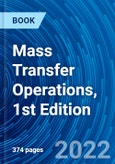Mass Transfer is the net movement of a mass of a chemical species from a region of higher concentration to a region of lower concentration. It occurs in many industrial and non-industrial processes. Mass transfer is used by different scientific communities for different processes and mechanisms. Mass Transfer Operation is one of the core courses at the undergraduate level of the Chemical Engineering curriculum.
The chapters are organized in a way that enables the students to acquire an in-depth understanding of the subject. The emphasis is given to the basic concepts of mass transfer operating, molecular diffusion, inter-phase mass transfer, humidification operations, drying, evaporation, crystallization, adsorption, novel separations and Mass transfer analogy, all coming under the realm of mass transfer operations. Apart from the numerous illustrations, the book includes review questions, exercises and aptitude test in chemical engineering which bridge the gap between theory and practical implementation. All numerical problems are solved in a systematic manner to reinforce the understanding of the concepts. This book demonstrates how to solve the industry-related problems in chemical Engineering practice.
This book is primarily intended as a textbook for undergraduate students of Chemical Engineering. It will also be useful for other allied branches such as Mechanical Engineering, Petroleum Engineering Polymer Science and Engineering, Bio-technology as well as Diploma in Chemical Engineering.
Salient Features
- Theoretical concepts are explained with examples.
- Numerical problems are solved in systematic way.
- Only SI unit is used
- Only essential theory part is discussed under each chapter.
Table of Contents
- Basic Concept of Mass Transfer Operation
- Molecular Diffusion
- Interphase Mass Transfer
- Humidification Operations
- Drying
- Evaporation
- Crystallization
- Adsorption
- Novel Separation Process
- Mass Transfer Analogy
List of Symbols
References
Index
Author
D.C. Sikdar - (Ph.D) is an Associate Professor, the Department of Chemical Engineering, Dayananda Sagar College of Engineering, Bangalore with more than three decades of teaching experience. Professor Sikdar has published many papers in national and international journals of repute. He received Best Research Award from Bio-fuel Development Board, Karnataka for guiding M.Tech project on Development of Bio-hydrogen Dependent Fuel Cell Using Micro Algae" in 2012. Professor Sikdar is also a member of the Indian Society of Technical Education (ISTE) and Indian Institute of Chemical Engineers (IICHE).








